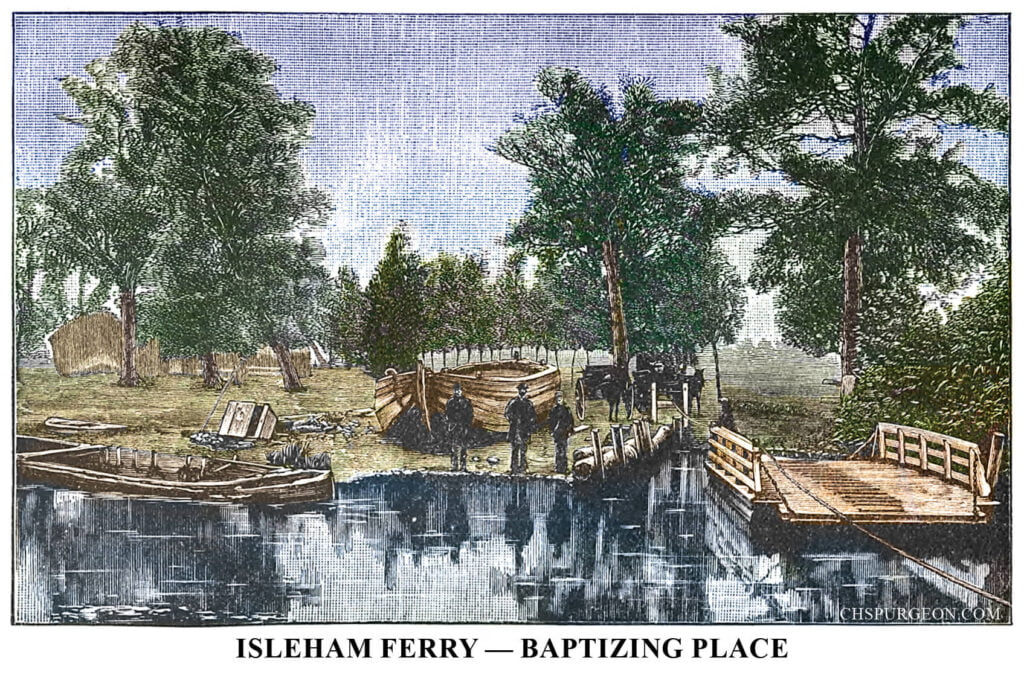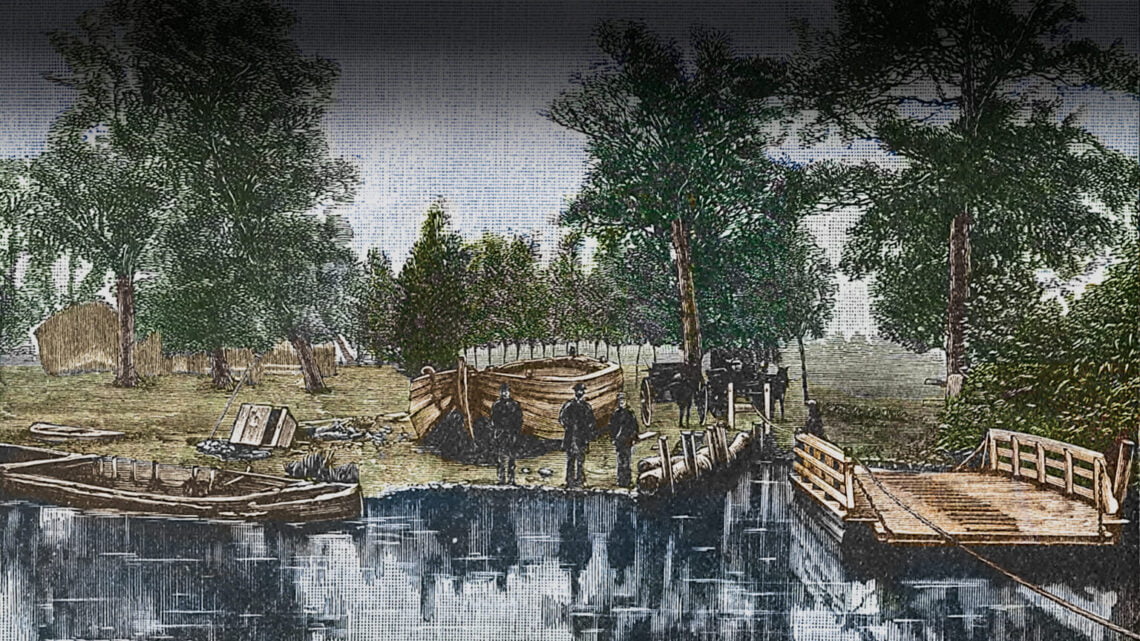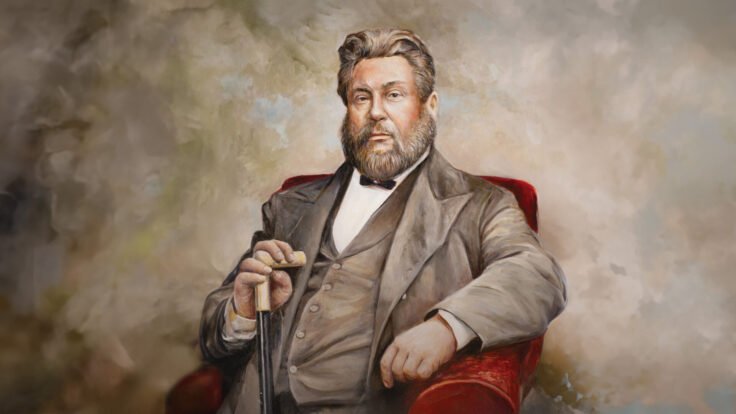Charles Spurgeon was baptized on May 3, 1850 at Isleham Ferry on the River Lark near Isleham, Cambridgeshire.
Of that event which took place just a few weeks shy of his 16th birthday, Spurgeon would later write “That open stream, the crowded banks, and the solemn plunge, have never faded from my mind; but have often operated as a spur to duty, and a seal of consecration.”
Although his beloved grandfather and father both held to infant baptism, Charles came under conviction that believer’s baptism was the proper view of this ordinance. He wrote to his father just a couple of weeks after coming to faith:
From the Scriptures, is it not apparent that, immediately upon receiving the Lord Jesus, it is a part of duty openly to profess Him? I firmly believe and consider that baptism is the command of Christ, and shall not feel quite comfortable if I do not receive it. I am unworthy of such things, but so am I unworthy of Jesus’ love. I hope I have received the blessing of the one and think I ought to take the other also. [1]
He wrote to his mother in February about his desire to openly profess Christ in this manner:
I have come to a resolution that, by God’s help, I will profess the name of Jesus as soon as possible if I may be admitted into His Church on earth. It is an honour,—no difficulty,—grandfather encourages me to do so, and I hope to do so both as a duty and privilege. I trust that I shall then feel that the bonds of the Lord are upon me, and have a more powerful sense of my duty to walk circumspectly. Conscience has convinced me that it is a duty to be buried with Christ in baptism, although I am sure it constitutes no part of salvation. I am very glad that you have no objection to my doing so. [2]
Spurgeon’s views on the importance of believer’s baptism can be found in volume 1 of his autobiography:
Baptism is the mark of distinction between the Church and the world. It very beautifully sets forth the death of the baptized person to the world. Professedly, he is no longer of the world; he is buried to it, and he rises again to a new life. No symbol could be more significant. In the immersion of a believer, there seems to me to be a wondrous setting forth of the burial of the Christian to all the world in the burial of Christ Jesus.
It is the crossing of the Rubicon. If Cæsar crosses the Rubicon, there will never be peace between him and the Senate again. He draws his sword, and he throws away his scabbard. Such is the act of baptism to the believer. It is the burning of the boats: it is as much as to say, “I cannot come back again to you; I am dead to you; and to prove that I am, I am absolutely buried to you; I have nothing more to do with the world; I am Christ’s, and Christ’s for ever.”
This is the way of salvation,—worship, prayer, faith, profession,—and the profession, if men would be obedient, if they would follow the Bible, must be done in Christ’s way, by a baptism in water, in the name of the Father, and of the Son, and of the Holy Ghost. God requireth this; and though men are saved without any baptism, and multitudes fly to Heaven who are never plunged in the stream; though baptism is not saving, yet, if men would be saved, they must not be disobedient. [3]
Given their differing views on baptism, Charles felt he should ask his parent’s permission before undergoing this ordinance:
As Mr. Cantlow’s baptizing season will come round this month, I have humbly to beg your consent, as I will not act against your will, and should very much like to commune next month. I have no doubt of your permission. We are all one in Christ Jesus; forms and ceremonies, I trust, will not make us divided.…[4]
Although it took some time to receive confirmation from his father, Charles was encouraged by his family to act on his convictions and so he arranged for his baptism to take place. His autobiography states:
According to my reading of Holy Scripture, the believer in Christ should be buried with Him in baptism, and so enter upon his open Christian life. I therefore cast about to find a Baptist minister, and I failed to discover one nearer than Isleham, in the Fen country, where resided a certain Mr. W. H. Cantlow. My parents wished me to follow my own convictions, Mr. Cantlow arranged to baptize me, and my employer gave me a day’s holiday for the purpose.
Cantlow was the nearest Baptist pastor to Charles. A little further on in his reminiscences, we learn more about him:
Mr. Cantlow was for some time a missionary in Jamaica, and is mentioned three times in Hinton’s Life of Knibb. For thirty-two years, this excellent man resided at Isleham, and was pastor of the church till age enfeebled him, and he welcomed our worthy student, Mr. Wilson, as his successor. He was great at giving the “soft answer which turneth away wrath;” he was beloved by his people, and universally respected in the village. His death serves as a landmark in my life, reminding me that the days are long past since I was generally spoken of as “the boy-preacher.”

Spurgeon’s baptism was arranged for the third of May, which happened to also be the birthday of his mother, Eliza. His letter to her on the occasion reflects his affection for his mother as well as his excitement for the day of his baptism:
My dear Mother,—
Many very happy returns of your Birthday! In this instance, my wish will certainly be realized, for in Heaven you are sure to have an eternity of happy days. May you, in your coming years, live beneath the sweet smiles of the God of peace; may joy and singing attend your footsteps to a blissful haven of rest and tranquillity! Your birthday will now be doubly memorable, for on the third of May, the boy for whom you have so often prayed, the boy of hopes and fears, your first-born, will join the visible Church of the redeemed on earth, and will bind himself doubly to the Lord his God, by open profession. You, my Mother, have been the great means in God’s hand of rendering me what I hope I am. Your kind, warning Sabbath-evening addresses were too deeply settled on my heart to be forgotten. You, by God’s blessing, prepared the way for the preached Word, and for that holy book, The Rise and Progress. If I have any courage, if I feel prepared to follow my Saviour, not only into the water, but should He call me, even into the fire, I love you as the preacher to my heart of such courage, as my praying, watching Mother. [5]

Below are Spurgeon’s reflections on the day of his baptism, an event which would make a deep impression on his heart and mind and one which he frequently looked back on with fondness. This comes to us from Spurgeon’s own pen as found in his autobiography in a chapter titled A Good Confession: [6]
I can never forget the 3rd of May, 1850; it was my mother’s birthday, and I myself was within a few weeks of being sixteen years of age.
I was up early, to have a couple of hours for quiet prayer and dedication to God. Then I had some eight miles to walk, to reach the spot where I was to be immersed into the Triune Name according to the sacred command. What a walk it was! What thoughts and prayers thronged my soul during that morning’s journey! It was by no means a warm day, and therefore all the better for the two or three hours of quiet foot-travel which I enjoyed. The sight of Mr. Cantlow’s smiling face was a full reward for that country tramp. I think I see the good man now, and the white, ashes of the peat-fire by which we stood and talked together about the solemn exercise which lay before us. We went together to the Ferry, for the Isleham friends had not degenerated to indoor immersion in a bath made by the art of man, but used the ampler baptistery of the flowing river.
Isleham Ferry, on the River Lark, is a very quiet spot, half-a-mile from the village, and rarely disturbed by traffic at any time of the year. The river itself is a beautiful stream, dividing Cambridgeshire from Suffolk, and is dear to local anglers. The navigation of this little River Lark is possible between Bury St. Edmund’s and the sea at Lynn; but at Isleham it is more in its infancy.
The ferry-house, hidden in the picture (above) by the trees, is freely opened for the convenience of minister and candidates at a baptizing. Where the barge is hauled up for repairs, the preacher takes his stand, when the baptizing is on a week-day, and there are few spectators present. But on Lord’s-day, when great numbers are attracted, the preacher, standing in a barge moored mid-stream, speaks the Word to the crowds on both sides of the river. This can be done the more easily, as the river is not very wide. Where three persons can be seen standing, is the usual place for entering the water. The right depth, with sure footing, may soon be found, and so the delightful service proceeds in the gently-flowing stream. No accident or disorder has ever marred the proceedings. In the course of seven or eight miles, the Lark serves no fewer than five Baptist churches, and they would on no account give up baptizing out of doors.
To me, there seemed to be a great concourse on that week-day. Dressed, I believe, in a jacket, with a boy’s turn-down collar, I attended the service previous to the ordinance; but all remembrance of it has gone from me: my thoughts were in the water, sometimes with my Lord in joy, and sometimes with myself in trembling awe at making so public a confession. There were first to be baptized two women,—Diana Wilkinson and Eunice Fuller,—and I was asked to conduct them through the water to the minister; but this I most timidly declined. It was a new experience to me, never having seen a baptism before, and I was afraid of making some mistake.
The wind blew down the river with a cutting blast, as my turn came to wade into the flood; but after I had walked a few steps, and noted the people on the ferry-boat, and in boats, and on either shore, I felt as if Heaven, and earth, and hell, might all gaze upon me; for I was not ashamed, there and then, to own myself a follower of the Lamb. My timidity was washed away; it floated down the river into the sea, and must have been devoured by the fishes, for I have never felt anything of the kind since.
I felt as if Heaven, and earth, and hell, might all gaze upon me; for I was not ashamed, there and then, to own myself a follower of the Lamb
CH Spurgeon
Baptism also loosed my tongue, and from that day it has never been quiet. I lost a thousand fears in that River Lark, and found that “in keeping His commandments there is great reward.” It was a thrice-happy day to me. God be praised for the preserving goodness which allows me to write of it with delight so long afterwards!
“Many days have passed since then,
Many changes I have seen;
Yet have been upheld till now;
Who could hold me up but Thou?”
After the baptism, there was a time of prayer and fellowship in the Isleham vestry. Of this, Spurgeon wrote:
In the Isleham Vestry, in the extremely gentle and cordial companionship of the pastor, I spent a very happy evening, which I recollect was very cold, so that a peat-fire, whose white appearance I still remember, was needed to warm the room.
Meanwhile, Cantlow’s successor JA Wilson reflected,
The recollection of the service at the river-side is fondly cherished by several still living, who rejoice that they were there. But the most precious memory of that day is the prayer-meeting in the vestry, in the evening”, where Mr. Spurgeon prayed, and people wondered, and wept for joy, as they listened to the lad. [7]
The recollection of the service at the river-side is fondly cherished by several still living, who rejoice that they were there. But the most precious memory of that day is the prayer-meeting in the vestry, in the evening”, where Mr. Spurgeon prayed, and people wondered, and wept for joy, as they listened to the lad. [7]
We are fortunate to have Spurgeon’s own immediate thoughts on the day’s events recorded. Spurgeon kept a diary in 1850 which covers April 6 to June 20 of his first year as a true follower of Christ. After having finally been baptized, Charles wrote at the end of the day:
May 3.—My mother’s birthday. May the sun of heaven shine upon her, and revive her, even as it has done upon the natural world this day! Started with Mr. Cantlow at eleven, reached Isleham at one o’clock. In the afternoon, I was privileged to follow my Lord, and to be buried with Him in baptism. Blest pool! Sweet emblem of my death to all the world! May I, henceforward, live alone for Jesus! Accept my body and soul as a poor sacrifice, tie me unto Thee; in Thy strength I now devote myself to Thy service for ever; never may I shrink from owning Thy name!
“Witness, ye men and angels now,
If I forsake the Lord!”
I vow to glory alone in Jesus and His cross, and to spend my life in the extension of His cause, in whatsoever way He pleases. I desire to be sincere in this solemn profession, having but one object in view, and that to glorify God. Blessing upon Thy name that Thou hast supported me through the day; it is Thy strength alone that could do this. Thou hast,—Thou wilt. Thou hast enabled me to profess Thee, help me now to honour Thee, and carry out my profession, and live the life of Christ on earth! [8]
Spurgeon truly did spend his life in the extension of the cause of Christ, and he would look back on the day of his baptism throughout his impactful ministry. He viewed the event not only as a vivid reminder of his salvation, but as a charge to be worthy of the calling to which he had been called.
That open stream, the crowded banks, and the solemn plunge, have never faded from my mind; but have often operated as a spur to duty, and a seal of consecration. From henceforth let no man trouble me, for He who first saved me, afterwards accepted me,—spirit, soul, and body,—as His servant, in token whereof this mortal frame was immersed beneath the wave.
The outward sign has often served to bring vividly before mind and heart the spiritual meaning, and therefore is it dearly loved, for His sake who both ordained the ordinance and Himself submitted to it. [9]

[1] Letters of Charles Haddon Spurgeon, Ian Murray, 20.
[2] Letters, 22.
[3] The Autobiography of CH Spurgeon, 147.
[4] Letters, 25.
[5] Letters, 25.
[6] Autobiography, 145-152.
[7] Autobiography, 150.
[8] Autobiography, 131.
[9] Autobiography, 150.





